Are you enjoying this blog?
To join our newsletter, text BLOG to (833) 779-2627 or enter your phone number 👉
How To Start a Small Business in California
Learn how to start a small business in California with our comprehensive guide. Understand the landscape, legalities, marketing, and more.

Jump To...
The California Business Landscape | Create Your Business Plan | Choose Your Business Structure | Register Your Business Name | Understand California's Tax Obligations | Obtain Necessary Permits and Licenses | How To Set Up Your Business Finances | Understand California Labor Laws | Additional Resources to Help You Start Your Small Business in California
Starting a small business in California can be an exciting and rewarding venture. With its diverse economy, population, and resources, the Golden State offers plenty of opportunities for entrepreneurs to succeed.
However, it’s important to know what steps to take when starting a business in California so that you can maximize your chances of success. Here are some tips on how to start a small business in California.
The California Business Landscape
When considering starting a small business in California, it’s important to know what you are getting yourself into.
California is one of the most expensive states to do business in, due to high taxes and regulations that can make it difficult for businesses that fail to plan ahead. As you can see in the graphic below, California has an average 8.84% corporate income tax rate.
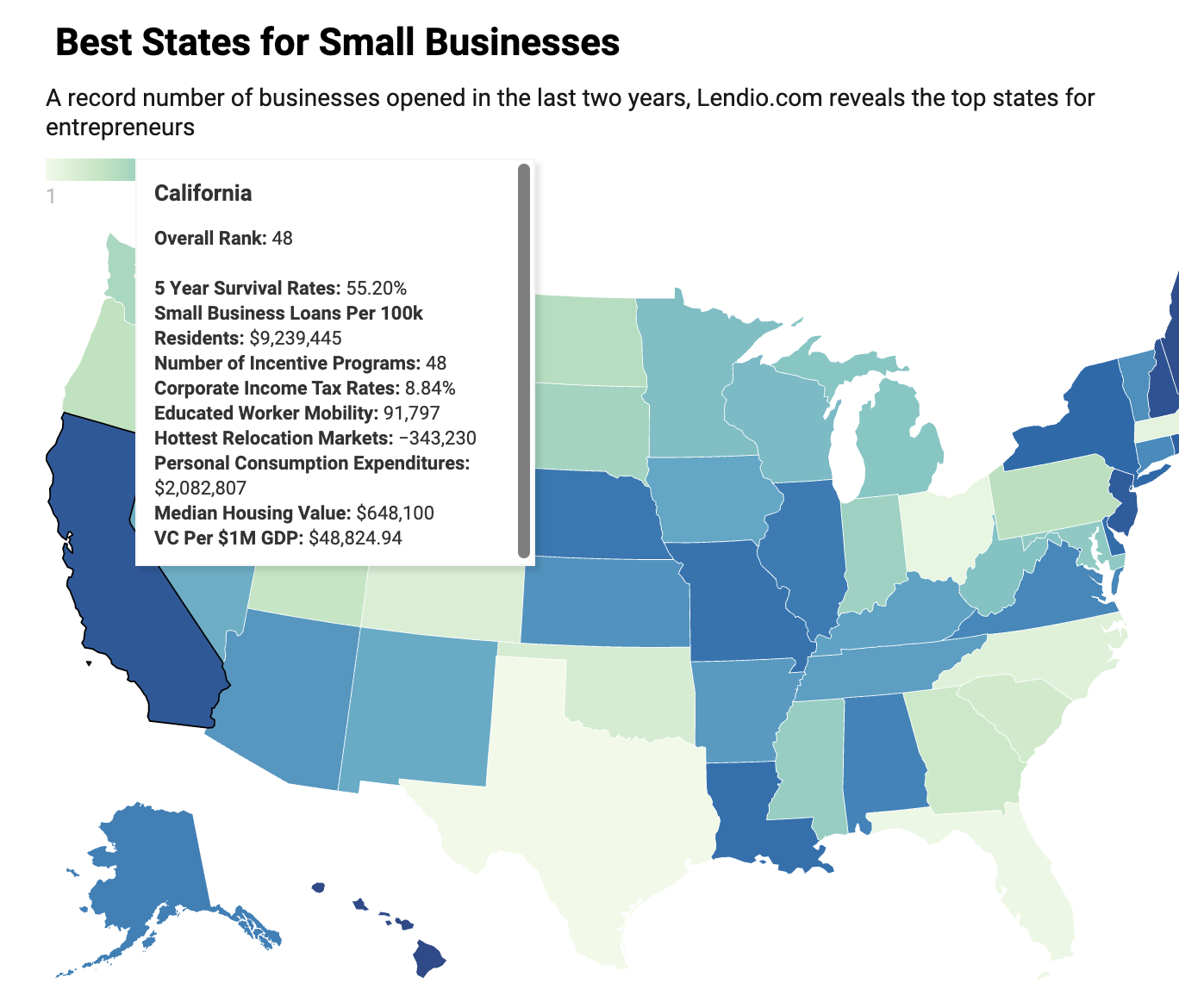
Source: Lendio’s 2022 Analysis
In addition, California has some of the most stringent environmental laws in the nation, specifically the California Environmental Quality Act (CEQA), which could present an additional challenge for any new business looking to enter the market.
Despite all these challenges, there is more earning potential than in any other part of North America. According to Forbes Advisor, California ranked as the twelfth best state to start a business in 2022, making it into the top 25%, as seen in the graphic below.
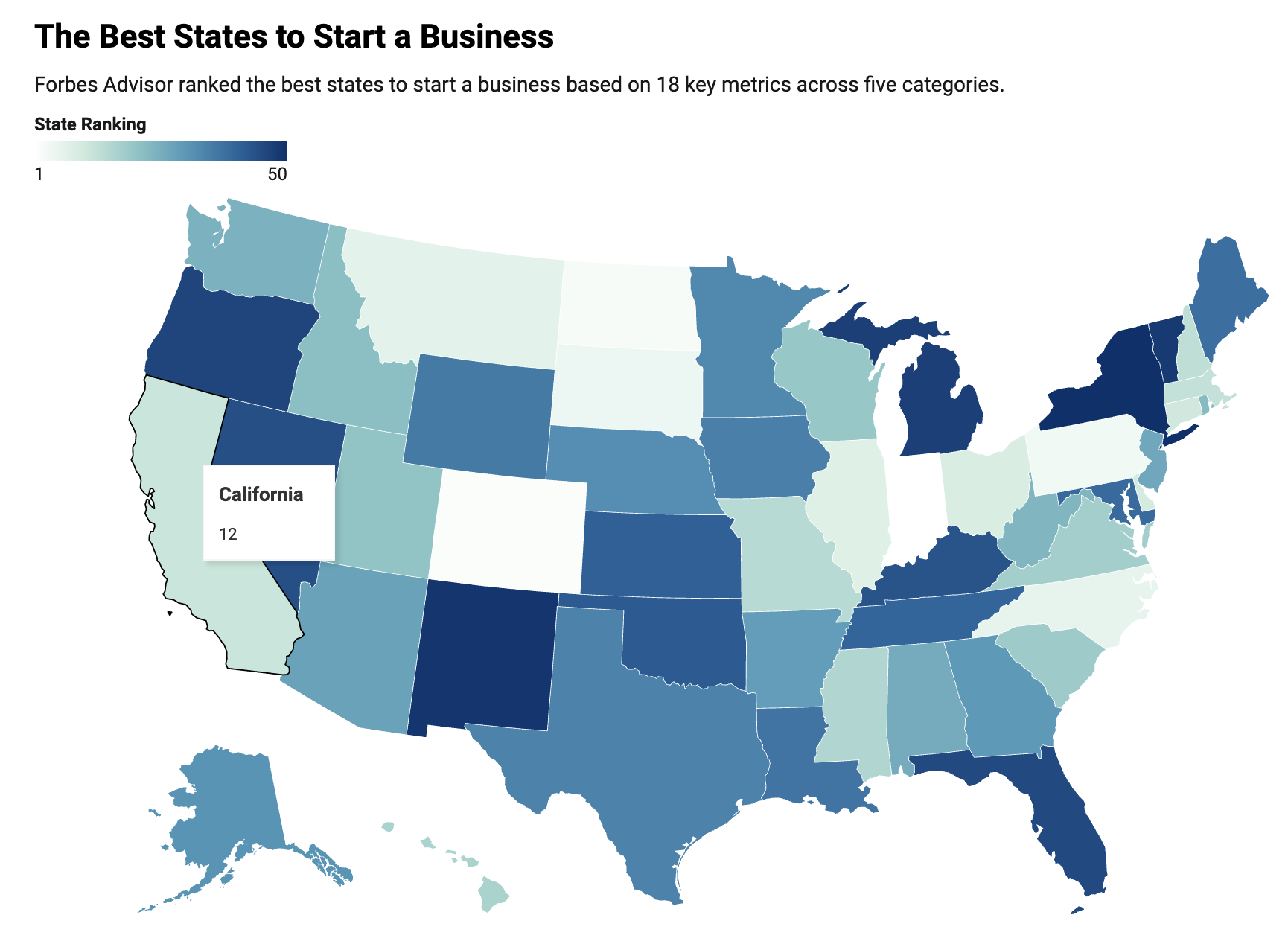
Source: Forbes’ 2022 Analysis
You should also consider what the average customer in California looks like, as factors like their income, preferences, and spending habits factor into whether your business will be a success.
As previously mentioned, California is one of the most densely populated states, and that population is, on average, middle or upper-middle class. According to Fit Small Business, seen in the graphic below, the average household income in California is $78,627 in 2023.
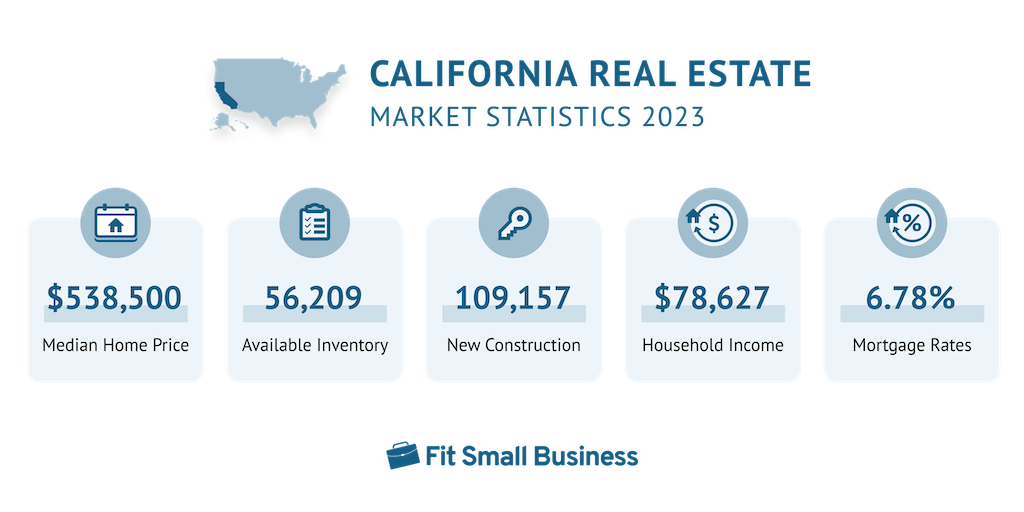
Source: Fit Small Business
Even more compelling is World Population Review’s data on mean household income by state, which ranks California as the sixth highest of all fifty states, coming in at $111,622. This means Californians will have extra money to spend, even despite higher taxes.
So all in all, a business venture in California is a good idea, but you must have a plan that anticipates higher expenses and compliance standards.
The Overwhelming Demand for Skilled Trades Professionals in California
| Population (California is the most populated state) |
Total Housing Units (California has the most housing units in the U.S.) |
Total Homeowners |
New Construction Projects (per year) |
|
| Numbers contributing to high demand for home and contractor services in California |
40.2 million - 12% of all U.S. residents |
14.5 million |
~20 million |
1.4 million |
Sources: World Population Review, U.S. Census Data, Index Mundi
One of the most lucrative businesses to start right now is a skilled trades profession, which includes occupations like electricians, plumbers, contractors, etc. This is because the demand for these services continues to outpace the supply of skilled trades professionals in California, thanks to a booming construction industry and population growth.
Want some simple tools to help you jumpstart your new California business? Text GOSITE to (833) 779-2627 to learn more.
As you can see in the chart above, the high population in California is requiring more new home construction, and with the population only growing, less personal desire to do household tasks, and a lack of skilled professionals generally, skilled laborers are needed more than ever.

Source: Census.gov
From the census content above, you’ll also notice that a very high number of residential buildings are being constructed, and these buildings are at all stages of the process, meaning work still has to be done by all types of skilled laborers.
With all of these new residences, many of the people who move in will need transportation to get to their job, and, with that, skilled trade professionals in the auto industry. But just how many cars are we talking about?
California has the most car owners with over 14 million registered vehicles. That is 950% higher than the United States median.
You can take a look at the bar graph below for a visual representation of just how many vehicles that is. And for every one of those vehicles, at least one skilled mechanic is needed, not to mention the many other professionals a car needs to stay running.
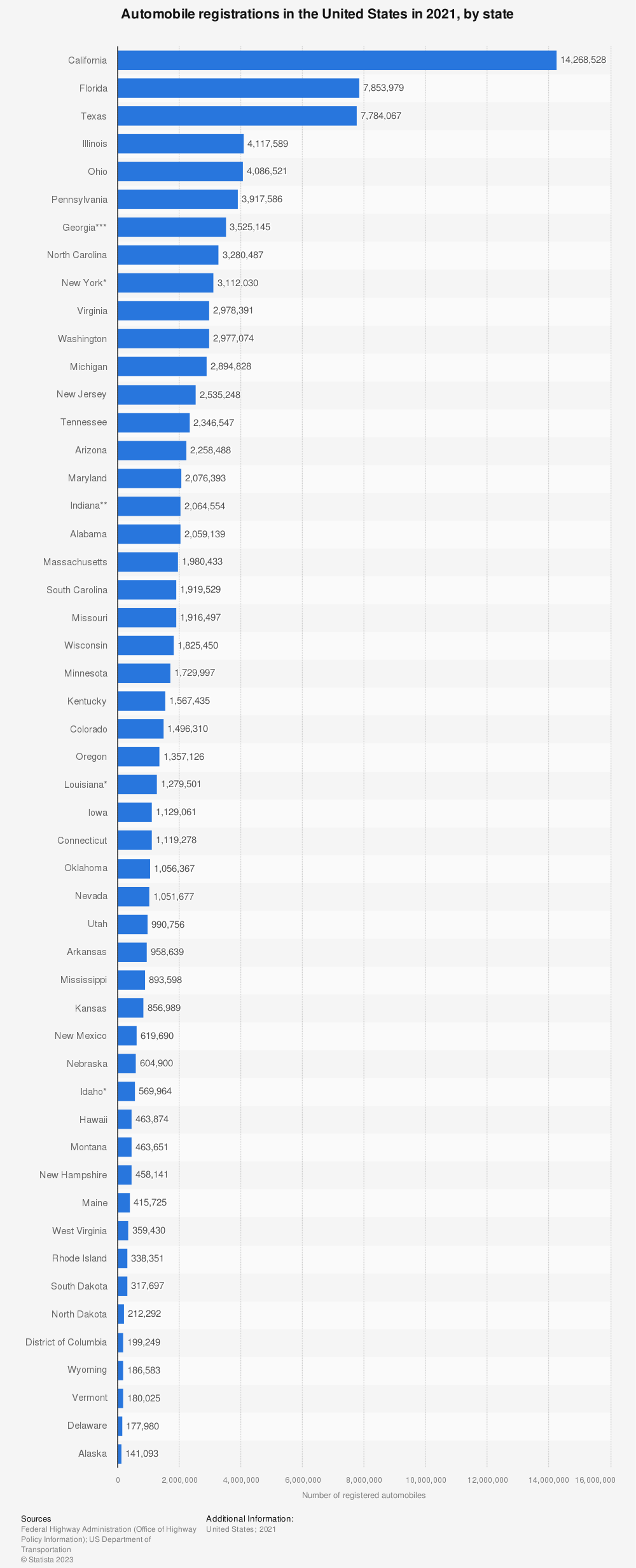
Source: Statista
Create Your Business Plan
The first step in the business planning process is to create a business plan. This document should include your business concept, strategies, and unique aspects.
The length of your business plan will depend upon whether or not you’re using it to secure funding. For example, SBA loan business plans are quite extensive. But if you’re just building a plan for yourself and your team, you likely only need a one-page plan along with some pro forma financial statements.
Define Your Business Concept: Your Products/Services, Business Model, etc.
Before you start any business, it’s important to have a well-defined business concept. This includes what products or services you are offering, how you plan to make money (business model), and how you plan to compete in the market.
For example, a plumber might offer plumbing services on a contract basis, meaning clients pay them for each job they do, making the payment process less daunting for a client because they understand exactly what they are paying for.
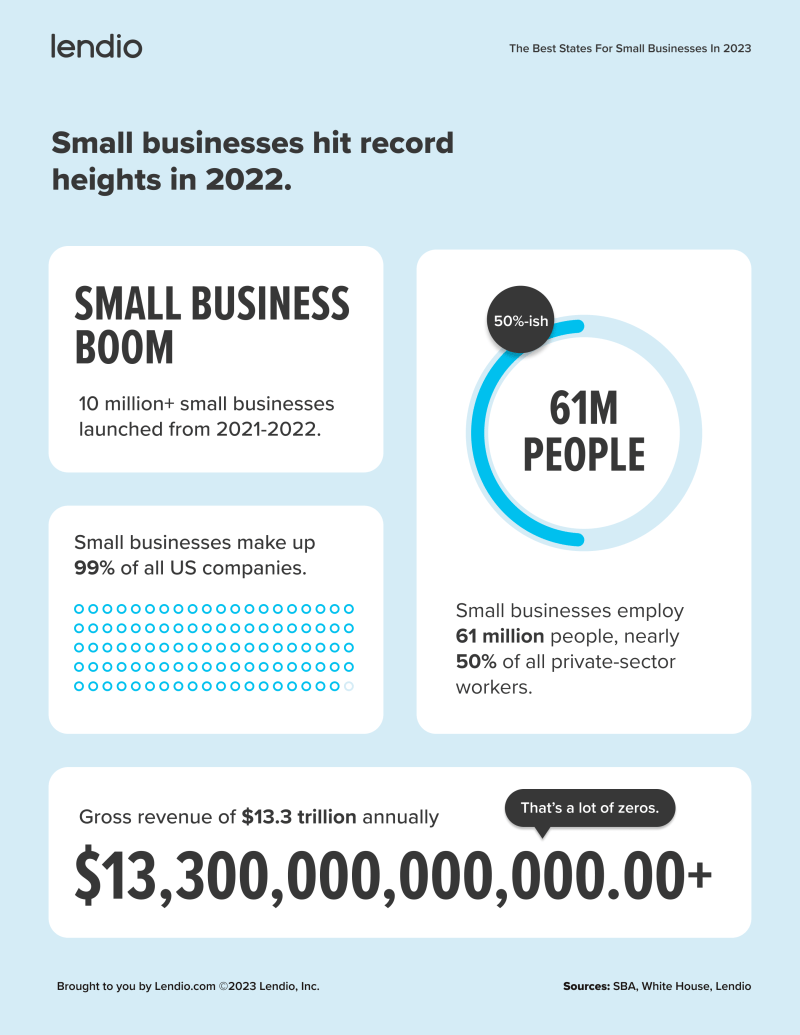
Source: Lendio
Some investors or partners may doubt your business because you want to stay small and aren’t looking for upward growth, but the statistics above show just how lucrative businesses who stay small can be. Graphics and data like this are always good to include in your business plan or model because they help others understand why staying small can help you reap big rewards, therefore giving others much more faith in your plan.
Similarly, launching your business as a larger venture - because you have the capital and manpower to do so - is also a valid approach. This affords you a wider market and the ability to service a far larger number of customers.
Market Analysis and Strategy
An important part of your business plan is the market analysis and strategy. This means that you need to analyze the current market trends for your industry, including what competing businesses are doing. You may also want to research with potential customers, perhaps through a focus group or looking at customer reviews of similar businesses online.
With this data in hand, you can create a well-thought out marketing strategy that will help you stand out from competitors and attract customers.
How Will You Set Your Business Apart from Your Competitors?
Think about what makes your business unique compared to similar businesses in your area. Maybe you can provide a higher quality product or cheaper pricing than competitors. Or perhaps you offer something totally different that the competition doesn’t have.
No matter what sets your business apart, be sure to include this information prominently in your marketing materials and on social media sites such as Facebook and Twitter. This will help customers easily identify why they should choose to do business with you over everyone else.
Choose Your Business Structure
The next step is to choose the right business structure for your company. This will depend on the size and scope of your business, as well as the type of taxes you want to pay.
Are you enjoying this blog?
To join our newsletter, text BLOG to (833) 779-2627.
The most common types of businesses in California are sole proprietorships, partnerships, corporations, and LLCs (limited liability companies). Each structure has its own advantages and disadvantages, so it’s important to learn about them all to decide which is best for you.
Sole Proprietorship, Partnership, LLC, or Corporation?
| Type of Business |
What It Is |
Pros |
Cons |
| Sole Proprietorship |
Just you owning and running your business. |
Simplest way to start a business; you're in full control. |
If your business owes money, you personally owe that money; can be tough to get loans or investors. |
| Partnership |
You and one or more others own and run the business together. |
Easy to start; everyone shares in paying for things; you can benefit from your partners' different skills. |
You and your partners are responsible if the business owes money; you might disagree with your partners on business decisions. |
| Limited Liability Company (LLC) |
A mix of a partnership and a corporation that helps protect you from business debts. |
Protects your personal stuff if the business can't pay its debts; taxes are simpler; not a lot of complex paperwork. |
Costs more to start than a partnership or sole proprietorship; you might have to pay extra taxes for social security and Medicare. |
| Corporation (C-Corp) |
A separate business entity that you and any other owners control. |
Protects your personal stuff if the business can't pay its debts; it's easier to get loans or investors. |
Costs the most to start; you pay taxes on business income and then again on any profits you take home. |
| S Corporation (S-Corp) |
Like a regular corporation, but you don't have to pay taxes on profits you take home. |
Avoids double taxation; protects your personal stuff if the business can't pay its debts. |
You have to follow strict rules about running your business; you can only have up to 100 owners, and they all have to live in the U.S. |
Register Your Business Entity in California
After you have decided on a business structure, the next step is to register your business entity in California. This involves filing paperwork with the Secretary of State's office and paying any necessary fees.
Depending on the type of business structure you chose, there may be additional steps such as applying for an Employer Identification Number (EIN) or obtaining permits or licenses from local authorities. Overall, here’s what you should expect to do when registering your business:
- Choose a unique name for your California business.
- Decide on the legal structure of your business, such as a sole proprietorship, partnership, LLC, or corporation.
- Determine if you need to register your business with the state based on its type and location.
- Register with the IRS to obtain an EIN number and register for state taxes.
- Obtain any necessary permits and licenses from the state or local government depending on the type of business.
Register Your Business Name
Once you have registered your business entity, it’s time to register your business name with the state. This will ensure that no one else can use the same name for their own businesses. You should also consider getting a logo design for your company as this will help customers identify your brand. You can learn more about California’s business name registration process here.
Understand California's Tax Obligations
It's also important to understand California’s tax obligations. Depending on the type of business and where you are located, you may be required to pay taxes such as sales tax or payroll tax. Because the state’s tax laws are complicated, it’s best to consult a tax professional to help you with this step.
Obtain Necessary Permits and Licenses
In order to legally operate in California, you may need to obtain certain permits and licenses. These can range from health department permits for food-based businesses to zoning permits for retail stores. Make sure that you research what is required in your area before you start operating.
How To Set Up Your Business Finances
- Open A Business Bank Account - A business bank account will help you keep your personal and business finances separate.
- Set Up Accounting Software - Accounting software can help you track income, expenses, and other financial information.
- Obtain Necessary Insurance Coverage - Depending on the type of business you have, certain types of insurance may be necessary to protect your company in case of an accident or lawsuit.
How To Market Your Small Business in California
Marketing your business can be a daunting task, especially if you’re starting from scratch in the competitive state of California. To make it easier on you, here's a comprehensive guide, complete with helpful links from GoSite, one of the best business management platforms on the market.
Set Up an Online Presence to Help You Get Found Online
The first step to marketing your business in California is by setting up an online presence. This isn’t just about having a website, but also includes creating a company profile on Google, social media platforms and other review sites.
With GoSite's website services, you can quickly create a professional-looking website that accurately represents your brand.
Identify and Connect With Your Ideal Customers
Small businesses have the incredible advantage of getting to know their customers on a personal basis through face-to-face interactions, social media messages, and advertising around town.
Take advantage of all of this! Customers, especially those looking for a small business experience, appreciate you taking the time to get to know them and their wants and needs, and with this knowledge, your job for them will go a lot smoother.
Build Business Processes that Make It Easy for Customers to Do Business with You
Efficiency is key for any business, and for a small business, it’s crucial to employ your workers in areas where you really need them instead of areas that can be automated, such as invoicing, payments, customer data collection, etc. GoSite’s business management tools can help make automations that work perfectly for your business, whether you’re back-loaded with emails that need answering or can’t keep up with the fast pace of social media.
Understand California Labor Laws
It is important to understand these laws in order to ensure compliance and avoid costly penalties. Some of the most important laws to keep in mind are:
These laws are all about how, when, and how much employees are paid, keeping them protected by law. While some may believe these laws are stifling to a business, they’re really more helpful than not, telling you exactly how to treat your workers so that everyone is happy and healthy in the work environment you create.
Additional Resources to Help You Start Your Small Business in California
Starting a small business in California can be an exciting and rewarding experience, but also quite difficult without the right plan and information. To help make it easier on you, here are some additional resources:
- California Secretary of State Business Resources: This website provides a wealth of information on starting and managing a business in California.
- IRS EIN: This is the federal tax identification number for your business. It’s required to open a bank account, get loans and more.
- Small Business Administration (SBA): This government agency offers an array of resources to help small businesses start, grow and succeed.
- CalGold: This website provides information on the various permits and licenses you may need to operate your business in California.
- GoSite’s Small Business Resources: Get helpful advice, tips and resources for running your small business from one of the most trusted names in business management services.
%20(1)%20(1).png?width=340&name=Group%2012%20(2)%20(1)%20(1).png)



